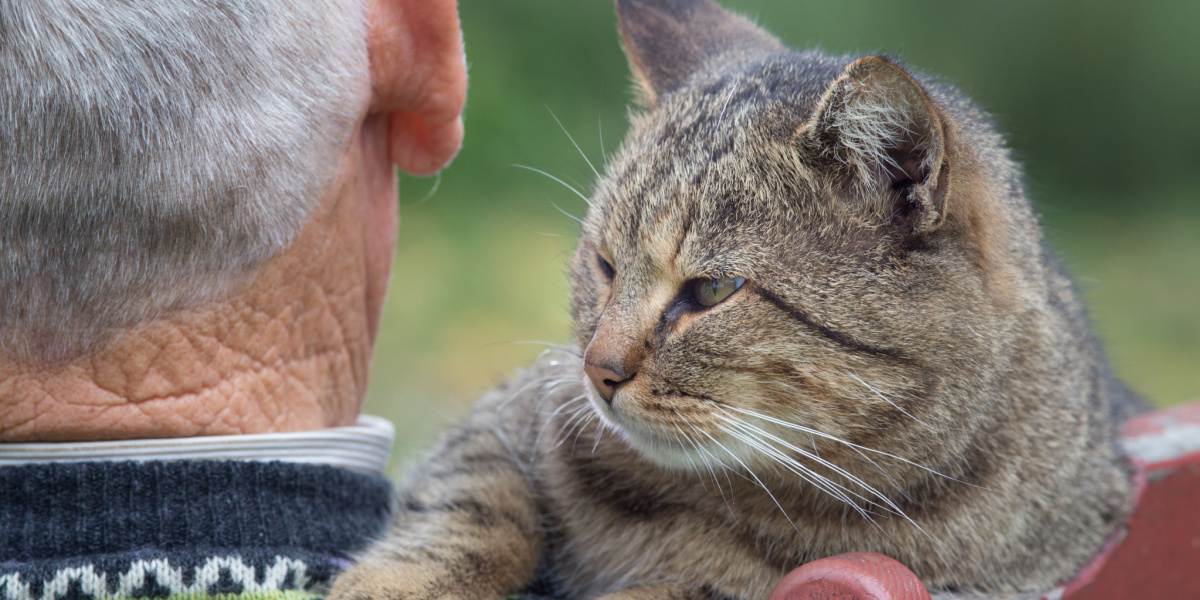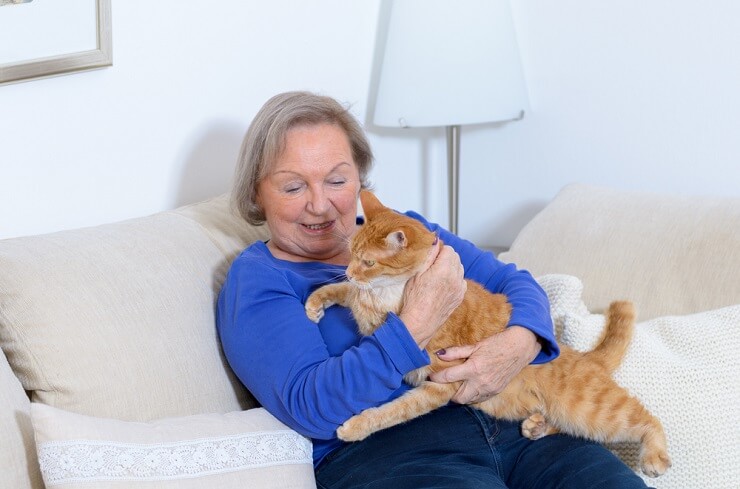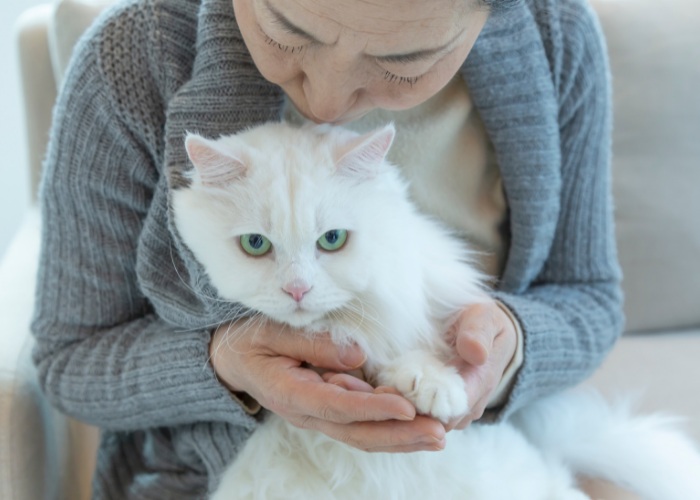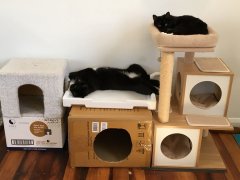
Cats are extremely intuitive and instinctual animals. Although it has not been proven scientifically, many people believe that cats can sense death in humans and even seem to know when their own time is up. Cats have long been known to take themselves off to a safe secluded space before they die, but do they really know?
No one knows for certain whether cats can really sense death, though this phenomenon has long been observed. It's possible that cats can smell changes in a dying person's body or detect low body temperatures. Cats seem to mourn when they lose human family members, but we don't know if cats experience grief for other cats.Key Takeaways
One Special Cat With a Special Sixth Sense
A nursing home in Providence, Rhode Island, that cared for terminally ill people was home to a cat called Oscar. As well as having the important role of companion to the residents, the caregivers started to notice Oscar was doing something strange.
Oscar seemed to know when residents of the nursing home were nearing death and he’d go and lie on their bed and purr. In their moments before death, Oscar would be with them if their family members couldn’t get there in time.
Oscar’s ability for knowing when the residents were going to die astounded the doctor caring for them and he wrote a report about the cat’s accuracy in the New England Journal of Medicine.
What Can Cats Sense?
There is little known yet about how cats might be able to sense death, but it is hypothesized that cats might be able to use their incredible sense of smell to detect when people’s organs are shutting down.
A dying person might also give off different pheromones that cats might pick up with their heightened senses. Cats have been known to detect other illnesses with their sense of smell so it is certainly plausible they can sense a chemical released just before humans die.
Cats could also be able to sense a decreased body temperature in people close to dying as they might become more still. The change in body language could also alert cats to what is about to happen.
How Can Cats Warn You of Death?

Cats sometimes start spending extra time with people who are close to dying.
Cat owners have regularly reported behavioral changes in their cats before loved ones died. Like with Oscar, cats have given people extra attention, become clingy, and started purring and cuddling a lot more than they normally would.
These changes in behavior also reflect behaviors cat exhibit when they know they’re about to die, too. When cats sense they are at the end of their life, they might be more prone to snuggling with their owner to let them know in their own way.
Cats tend to find quiet places to lie down in when they sense their own death. You might find them curled up under the bed or in an open closet if they’re an inside cat, or under the car or some bushes if they’re an outside cat.
Do Cats Know When They’re Going To Die?
Although there is little scientific evidence to prove this, pet owners might notice a change in their cat’s behavior in the days leading up to their death. Cats that aren’t normally vocal might meow or purr more. As with humans, cats nearing their death might eat less and might have a change in mood or appear unkempt.
Cats at the end of their life can often be in pain or feel weak, so they might not use their litter box as well as they normally would. Cat owners can’t do much to help a really old cat but simply strive to make them as comfortable as possible.
A change in mood might also look like a normally very loving cat becoming standoffish, grumpy, or quiet. They could avoid being picked up or stroked.
Cats and Grief
Cats are very good at mirroring our human behaviors and moods. If we are happy, cats are happy. If we are sad or angry, cats will pick up on this, too. Grieving cat owners might notice their cat be a little quieter than normal if they’ve noticed a big mood change.
It is impossible to say if cats grieve for their own. Cats are not herd or pack animals so are more independent than dogs and would therefore normally not care too much for other cats dying in the wild.
When cats have lost a human companion they were very close with, they can mourn them and will assume a quieter demeanor. Sometimes they become clingier or attached to remaining family members or might be seen searching for the person who has died.
Final Thoughts

It seems that cats may well have a very good instinct for sensing when death is near, either for themselves or for their owners or carers.
It seems that cats might have good instincts for sensing when death is near, either for themselves or for their owners or carers. Although each cat might communicate this in a different way, if you know your cat well it will be easier to recognize major changes in their normal behavior.
As shown with Oscar, the cat that lived in a nursing home, learned behavior for notifying people to someone nearing their death does happen. Cats also have their special ways of telling us when something is wrong.
Also Read: Understanding Your Cat’s Five Senses
Frequently Asked Questions
Can cats sense when something is wrong?
Cats are very intelligent animals and extremely sensitive to change and the body language of their owners. Therefore, if someone is acting different, smelling different, or even sounding different, cats will pick up that something might be wrong.
Do cats care if you cry?
Cats will notice when you cry and if they are normally quite affectionate, they might be affected by it. It’s hard to discern if cats care, however, because they struggle to communicate concern.
Do cats fear death?
Cats likely don’t think about death throughout their life although they seem to know when they’re coming to the end of their life. There is no scientific evidence to prove that they fear death. As highly instinctual animals, they probably realize when they are slowing down but know it is the natural course of life.
How do I know if my cat is trying to tell me something?
When you know your cat well, sudden changes in behavior should be very noticeable and could mean your cat is trying to tell you something. This might be that they’re more clingy and more vocal or standoffish and quieter.








It said it isn’t known if a cat grieves another cat, which may mean other cats of the neighborhood. But, I know a cat grieves and mourns. This cat friend of mine many moons ago was pacing back and forth, up and down the road. I’ve never seen a cat do that. Where I was wondering what’s going on. A little later I found she had a kitten that was killed. Where then it all made sense.
When one of my cats died, he lied next to an oven for the day (waiting for my parents came home to bury him) and my other cat were lying beside him in grief and they cuddled kind of while I was crying. So yes, cats DO grief when other cat members pass away.
Last summer I was in the hospital for 11 days. My husband said the cat never left my side of the bed except to eat and use the catbox. I told him to put the phone on speaker and I talked to her, trying to sound as normal as possible. She immediately perked up and afterward she spent more time moving around the house and sitting with our son. When I came home, she followed me everywhere and wouldn’t let me out of her sight. I think she was afraid I’d “get lost” again.